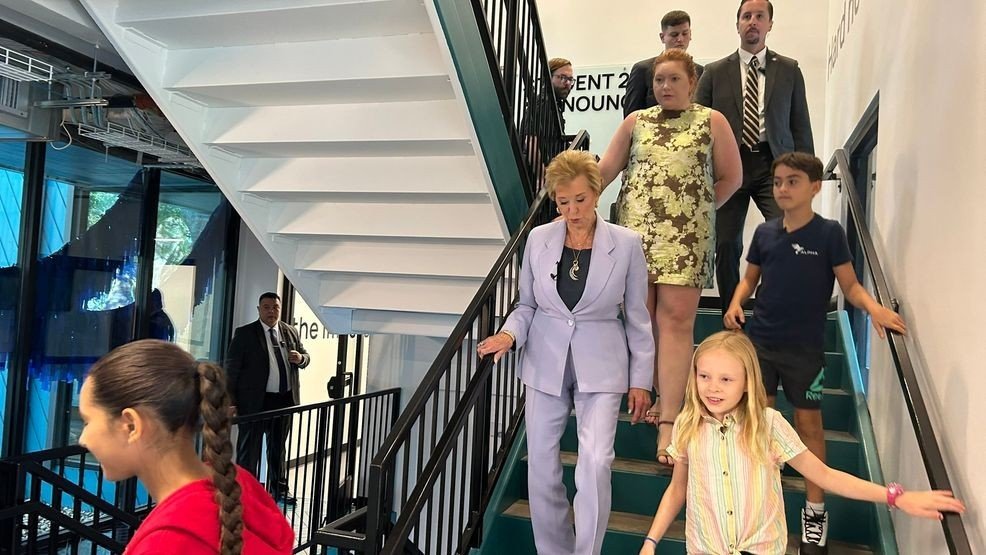AI Research
CoreWeave Stock Rises on News of Nvidia-Backed Firm’s VC Fund for AI Investments

Key Takeaways
- CoreWeave has launched a venture initiative designed to support founders of new artificial intelligence efforts.
- The artificial intelligence cloud computing firm’s CoreWeave Ventures will offer direct investment capital and other assistance designed to bring new ideas to market faster.
- CoreWeave shares hit the market just five months ago, and shares have more than doubled since then.
CoreWeave (CRWV) shares gained 4% in morning trading after the artificial intelligence (AI) cloud computing platform announced plans to support new AI efforts.
The Nvidia-backed company said it was starting CoreWeave Ventures to provide “investment resources, technical expertise, and compute” to help AI founders bring new ideas to the market more quickly.
The assistance will range “from direct capital investment and compute-for-equity transactions to technical collaboration and go-to-market opportunities.”
Co-founder and Chief Development Officer Brannin McBee explained CoreWeave Ventures is designed “to give other audacious, like-minded founders the support they need to drive technical advancements and bring to market the next class of innovation.”
The company noted that CoreWeave Ventures “is already working with a diverse group of innovators, from foundational model developers building novel large language models to pioneers in vertical AI applications and infrastructure.”
Shares of CoreWeave, which only began publicly trading in March, are up about 150% since then.
AI Research
Oxford and EIT Secure £118 Million for AI-Driven Vaccine Development Research – geneonline.com
AI Research
U.S. Secretary of Education visits Austin school, talks the future of AI in classrooms

AUSTIN, Texas — U.S. Secretary of Education, Linda McMahon, paid a visit to a private school in Austin on Tuesday to learn more about its use of artificial intelligence in classrooms.
McMahon visited the Alpha School in Austin, a school providing students with an AI-powered learning model.
According to school co-founder MacKenzie Price, students spend just two hours of the day in a traditional learning setting, making progress at their own pace using AI-generated lesson plans. “Guides,” instead of teachers, assist students as they move through the program and provide motivation for students. The rest of the day, students spend in workshops and on project-based learning.
Price said students are not able to use chatbots, like ChatGPT. Instead, AI is used to generate resources to guide students through the learning process.
“There’s so much fear, there’s so much uncertainty around an AI-first school. And as she’s able to see, this is not some robo-terminator teacher leading in front of a classroom,” she said.
McMahon, who President Donald Trump has tasked with turning the powers of the Department of Education over to individual states, is currently on a tour of schools across the country.
“I’m blown away from what I’ve seen so far and I’m trying to take it all in,” McMahon said.
Her visit comes as the Department of Education released the Nation’s Report Card, which shows declines in students’ test scores in reading, math and science.
McMahon told reporters on Tuesday that she does not believe in federal mandates for schools. Instead, she wants to build resources for schools and provide “best practices” based on school models from her visits.
“There is so much to do, so much opportunity. I’m so excited, I want to run right out to about 50 schools and say, ‘Okay, get your people together, pack your bags, come up here and see what they’re doing,'” she said.
Price explained the AI model helps fill in gaps for students who may be behind in curriculum from previous grades.
“Unfortunately, as a result of the pandemic, everyone hoped kids would catch up, and the opposite is happening,” she said. “Artificial intelligence can create these personalized learning plans that fill those holes and meet students where they need to be.”
Price, who supports school choice, said the state’s education savings account program, which goes into effect next year, is a step in the right direction.
“My goal is that this model of education can be more accessible to as many families as possible in Texas,” she said.
Opponents of school choice and voucher programs, like the Texas State Teachers’ Association, have criticized them for only benefiting families that can already afford private education.
“Meanwhile, most of Texas’ poorest families, even with vouchers, will not be able to afford the tuition and fees of Texas’ most popular private schools or the related transportation costs for their children. Many vouchers instead will become tax subsidies for upper income parents whose children already attend private school,” TSTA’s president, Ovidia Molina, said in a statement earlier this year.
McMahon plans to visit all 50 states in an effort to review different types of education models, while also supporting school choice programs.
AI Research
Nazareth is instructing teachers how to take on artificial intelligence

Colleges are preparing the next generation of teachers to manage artificial intelligence in the classroom, and at Nazareth University, that includes ways to use AI for teaching English to language learners.
It’s a shift in thinking for Rui Cheng, program director for the graduate Teaching English to Speakers of Other Languages (TESOL) program.
“I think the biggest controversy for us now is whether using AI will be helpful or detrimental to students’ learning,” Cheng said. “I don’t think there is like the one fixed answer. So, this is why we are still in the exploration stage. … We cannot just close our eyes and just pretend it’s not there.”
Risks like plagiarism and cheating exist regardless of whether teachers engage with the technology in class themselves, she said, adding that relying heavily on AI can have detrimental effects on long-term outcomes like literacy and communication skills.
“We know it’s inevitable,” she said. “AI is in everybody’s life now, but we want to try to help students to get into the mindset of collaborating with AI, not using AI to do the work for them.”
Now, Cheng and others are looking at how AI can complement students’ learning experience, like roleplaying for building conversation skills or assisting teachers with routine tasks.
“There’s a bit of a conflict,” Nazareth graduate student Alec Calabrese said. “I feel that many teachers are still pretty against AI, but I know a lot of academics are starting to come up with models of using AI as a tool in the classroom.”
Calabrese, who began teaching English language learners at Rochester Early College International School this school year, said it’s almost an arms race of sorts. Calabrese previously worked at a rural school in Connecticut.
“I know a lot of teachers are interested in making a shift toward actually assigning assignments where students would have to use AI to complete them,” he said. “But also, a lot of districts still completely block all AI tools to prevent plagiarism.”
Nazareth University is looking to add a certification program for applied educational leadership for technology and AI integration, Cheng said. The School of Education’s dean said it is in the early stages of development.
-

 Business2 weeks ago
Business2 weeks agoThe Guardian view on Trump and the Fed: independence is no substitute for accountability | Editorial
-
Tools & Platforms4 weeks ago
Building Trust in Military AI Starts with Opening the Black Box – War on the Rocks
-

 Ethics & Policy1 month ago
Ethics & Policy1 month agoSDAIA Supports Saudi Arabia’s Leadership in Shaping Global AI Ethics, Policy, and Research – وكالة الأنباء السعودية
-

 Events & Conferences4 months ago
Events & Conferences4 months agoJourney to 1000 models: Scaling Instagram’s recommendation system
-

 Jobs & Careers2 months ago
Jobs & Careers2 months agoMumbai-based Perplexity Alternative Has 60k+ Users Without Funding
-

 Education2 months ago
Education2 months agoVEX Robotics launches AI-powered classroom robotics system
-

 Education2 months ago
Education2 months agoMacron says UK and France have duty to tackle illegal migration ‘with humanity, solidarity and firmness’ – UK politics live | Politics
-

 Podcasts & Talks2 months ago
Podcasts & Talks2 months agoHappy 4th of July! 🎆 Made with Veo 3 in Gemini
-

 Funding & Business2 months ago
Funding & Business2 months agoKayak and Expedia race to build AI travel agents that turn social posts into itineraries
-

 Podcasts & Talks2 months ago
Podcasts & Talks2 months agoOpenAI 🤝 @teamganassi

